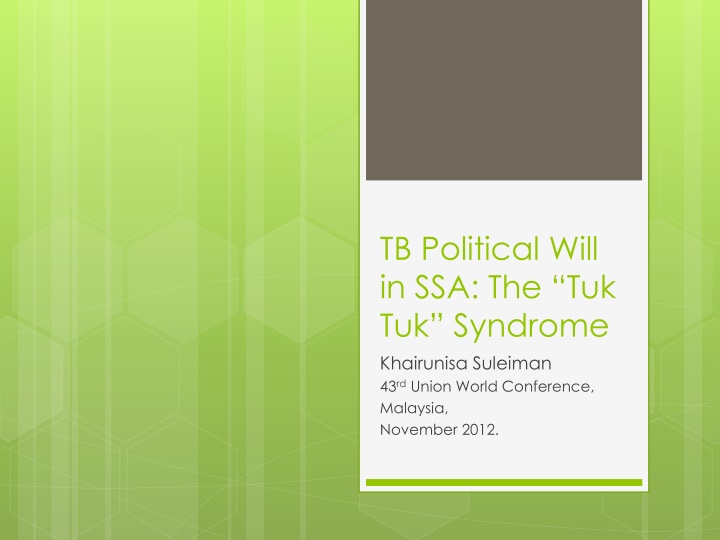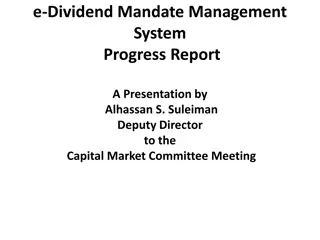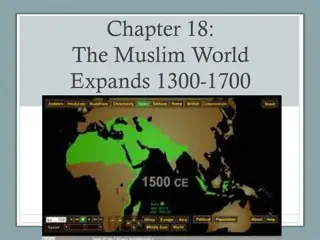
Political Will for Tuberculosis Control in Sub-Saharan Africa
Explore the challenges and commitments surrounding political will in addressing tuberculosis (TB) in Sub-Saharan Africa, as discussed in Khairunisa Suleiman's presentation at the 43rd Union World Conference in Malaysia. The summary delves into funding issues, prevention strategies, and the need for improved healthcare facilities to combat TB effectively.
Uploaded on | 1 Views
Download Presentation

Please find below an Image/Link to download the presentation.
The content on the website is provided AS IS for your information and personal use only. It may not be sold, licensed, or shared on other websites without obtaining consent from the author. If you encounter any issues during the download, it is possible that the publisher has removed the file from their server.
You are allowed to download the files provided on this website for personal or commercial use, subject to the condition that they are used lawfully. All files are the property of their respective owners.
The content on the website is provided AS IS for your information and personal use only. It may not be sold, licensed, or shared on other websites without obtaining consent from the author.
E N D
Presentation Transcript
TB Political Will in SSA: The Tuk Tuk Syndrome Khairunisa Suleiman 43rdUnion World Conference, Malaysia, November 2012.
Table of Contents Political will: The Past and the Current! Playing yoyo What we must do?
Political Will: TB Response Diagnosis for all groups Intensified Case finding TB response Prevention: Vaccines/ Awareness Human Rights, Preventative therapy/ /Education Patient centered approach, Integrated Health system, Infection control Adequate Funding Treatment Figure 1: Approach to TB Response Diagram by Khairunisa Suleiman.
Political Will: Funding commitments-are we serious? Government spent US$ 1.05 million for 350 Parliament chairs in 2012 in Kenya! 2012: TB funding shortfall in Kenya is US$ 32 million, only 41% of total TB budget was funded! US$ 53 million lost to National Hospital Insurance Fund (NHIF) Scandal!
Political Will: The past and current: Are we committed? TB is Preventable Infection Control (IC) Health Facilities (HF); breeding grounds of TB transmission IC guidelines still in draft format in some countries Nurses go on strike in Swaziland at Moneni Hospital because of their colleagues contracting TB (May 2012) Simple renovation is needed Provision of N-95 respirators Public Transport; limited involvement of minibus drivers- open windows campaign Homes; Community TB care-limited PPE for treatment supporters (who may be HIV positive; vulnerability and further spread of TB) Factories; TB breeding hubs in esp. developing countries
Political Will: The Past and Current
Political Will: The Past and Current TB is Preventable-cont Infection Control (IC) Fuelled by new drug-resistant strains and the HIV/AIDS pandemic, TB is spreading like wildfire through South Africa s mines and to the world beyond Desmond Tutu, Nov 2012 Mines; SADC Declaration- SA, Madagascar, Namibia, Zimbabwe heads of state have not signed! Prisons: Overcrowding e.g. SA, Malawi. No policies in place to monitor TB status of inmates, (i) entering into prison (ii) during sentence and (iii) prior to release. Limited referral system into public HF upon release from prison. No enablers (food and transport money) provided for recently released persons, who may be financially unstable
Political Will: The Past and Current Pollsmoor Prison in SA has a TB transmission rate of 90%!- Robin Wood SA prisons are overcrowded by 136% on average; 78 prisoners died of TB in 2011!
Political will: The Past and the Current: Are we committed? TB is Preventable-cont Awareness within communities Little knowledge on TB in certain communities Communities want to be actively involved Vaccines Why BCG? Commitment to develop new vaccines was low
Political will: The Past and the Current Some Species of Environmental Mycobacteria Block Multiplication of BCG and Induction of Protective Immunity to Tuberculosis Lise Brandt,1, Joana Feino Cunha,2 Anja Weinreich Olsen,1 Ben Chilima,3,4 Penny Hirsch,4 Rui Appelberg,2 and Peter Andersen1,* Infect Immun. 2002 February; 70(2): 672 678. PMCID: PMC127715 BCG elicits only a transient immune response with a low frequency of mycobacterium- specific cells and no protective immunity against TB in tested mice! Failure of the Mycobacterium bovis BCG Vaccine: The success and failure of BCG - implications for a novel tuberculosis vaccine. Andersen P, Doherty TM. Nat Rev Microbiol. 2005 Aug;3(8):656-62. BCG vaccine against tuberculosis (TB) has maintained its position as the world's most widely used vaccine, despite showing highly variable efficacy (0-80%) in different trials.
Political will: The Past and the Current: Are we breeding TB? TB is Preventable- cont Intensified Case Finding Diagnosis esp. in children, PLHIV and latent TB Sustainable TB/HIV integration of services (national to grass- root) Isoniazid Preventative Therapy Ambiguous initial WHO guidelines 6- 36 months of IPT Lack of (e.g. Kenya) or recently adopted (e.g. Swaziland) IPT guidelines in NTP s; sluggish implementation of IPT programme Failure of IPT programme in Botswana Weak data reporting tools Limited buy in from HCW-does resistance arise? Is it really effective if there are short-lasting effects after prophylaxis Rx-what is the cost benefit?
Political will: The Past and the Current TB is curable Diagnosis No POC diagnosis which is cheap No diagnostic machine that can diagnose TB strains that are resistant to pyrazinamide Issues: long time to diagnose and initiation of the correct TB regimen in most settings Screening for TB in PLHIV; often ad-hoc basis reporting tools is an issue too! Treatment Immediate initiation of ART for PLHIV with active TB-often not done Drug stock outs e.g. Kenya-first line drug stock outs CTBC unclear operational guidelines e.g. Botswana Slow implementation of CTBC-yet has been shown to work for over a decade! CHW not paid on time if ever paid or compensated
Playing yoyo WHO Frequent updating guidelines-instead of bold targets- Developing countries simply do not have the resources to frequently update their guidelines, these are resources that could be used in TB and overall public health system! Global Fund Delay in fund disbursement in Swaziland induced high attrition rates of CHW who play a critical in CTBC Cancellation of Round 11 Huge impact on Most at risk populations (MARP) Proposed reduction in already underfunded TB budget of GF: 16% instead of about 30%
What we must do? Embrace and implement the ZERO TB declaration Zero TB deaths, Zero New Infections, Zero TB suffering (Zero TB stigma)! Zero tolerance to TB thriving!- E.g. SA (Strategic plan includes Zero TB deaths, Zero TB stigma). KZN- management of MDR-TB treatment from 2007 to date. US: lowest TB levels in 20 years Ensure patient and community driven solutions to TB response adapted to setting Each Government (particularly those with high TB burden) must have ambitious targets and guidelines and sufficient committed domestic funding Multi-sectorial response: various stakeholders: increase domestic funding- sensitise Ministry of Finance so as to increase domestic funding Must have fully integrated TB/HIV response; reporting tools (surveillance), governance, treatment and prevention Need committed resources from public and private sector to improve diagnostics, treatment and vaccines (for all types of TB in all groups) Improve country policies so as to rapidly adopt/register new TB drugs and ensure ease of compassionate access to newly discovered treatment regimens
What we must do? Infection Control and Intensified Case Finding are needed: we must go to war for with TB transmission! Develop better Preventative Therapy therapies with long lasting effects and shorter course duration Awareness within communities is needed! Eliminate low TB knowledge in esp. HB settings! NTP in Zambia has endorsed the Three I s TB toolkit-easy messaging for TB prevention and treatment for communities Treatment Drug supply: countries should avoid drug stock outs at all costs Countries and preferably regions (pooled system; decrease pricing due to economies of scale) should take ownership in procuring TB drugs SADC countries that are short of MDR-TB drugs source from each other
Sign the Zero TB Declaration! www.treatmentactiongroup.org/tb/advocacy/zero-declaration THE END khairunisa.suleiman@gmail.com TB activist


